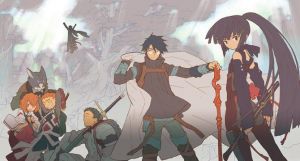by K. Hopson
Shows based on MMORPGs were popular this past season. If you’ve ever gotten wrapped up in Warcraft or League of Legends, you know how addictive these games can be. Personally, I’m really bad about getting sucked into games like Harvest Moon ‘cuz I’m simple like that. But that’s not an MMORPG.
Anyway, I noticed a lot of people were talking about Sword Art Online , but I have another option for you that is more interesting, in my opinion.
Log Horizon is excellent. I’ll admit I wasn’t that happy with the art style to begin with, but the writing is really impressive.
After the release of the game’s 12th expansion pack, over 30,000 players on the Japanese server are sucked into the Elder Tale online fantasy RPG universe. Naturally, the players have to learn how to survive in this new world. The premise is the same for Sword Art Online, except that a way out is established early-on—beat the game and you can go back to your world. Dying in the game means death in real life.
In Log Horizon, however, players initially think they’re invincible since no one truly dies. It’s only as they are learning to navigate the game world that players begin to realize game-death has real and horrifying consequences. And as of the end of the first season, there was still no way out of the game.
And there’s the big difference—the story. SAO’s plot isn’t bad, but it seems sort of…you know…Typical. There’s an established goal and death as a plot device thrown right in there for you. Everything’s kind of outlined from the get-go. Once you know who’s going to die, there really isn’t any reason to keep watching. (Keep in mind, this is my opinion.)
But Log Horizon leaves enough unknowns to keep you interested, which makes the game world feel much bigger and stranger. You want to know how the characters are going to find solutions to these problems. Not to mention that with SAO, it’s already established that the game’s creator caused the players to be sucked in. No one in the Log Horizon universe knows how or why the Apocalypse happened.
Unknowns that arise in exploration of the new world continue to drive the plot in Log Horizon. One thing I love about the series is how all of the dilemmas are realistic in terms of game mechanics. And there are so many of them. For example, fighting. Seems simple enough until you realize you’re not handling this with a mouse and keyboard anymore. The main characters are experienced players because they are almost all maxed-out at level 90. Still, they struggle with learning to use commands without their on-screen menus, strategy, attack times versus cool-down times, and character stats, all while keeping an eye on a real-time fight. The main characters’ high-levels eliminate the need to build a story around the boring process of leveling up, which means viewers can skip straight to the fun stuff.
There’s also the challenge of adjusting to your character’s body and movements. Let’s be real—almost no one would make a fictional character that’s exactly like their real-life bodies, so this is valid.
Besides the fighting, the series covers the socio-political dynamics and economics of this lawless game world. A few other major plot points include: PKing (that stands for Player Kill, y’all) and players who manipulate the rules of the game; learning how to eat/cook; and non-playable characters. My favorite is the issue with NPCs.
Before the Apocalypse, non-playable characters, known as People of the Land, were essentially a means to an end—they were only good for issuing side quests, buying and selling, and standard dialog trees. Now the People of the Land are more alive than ever, showing a range of emotions, long-term memories from before the Apocalypse (which will be important to finding out how to escape the game), and even family ties. They feel pain, too. Many players refuse to accept the facts, but the question now is whether they should continue to treat them like the NPCs of old or show them the same consideration they would for any other human.
Hopefully, I’ve said enough about Log Horizon’s plot to capture you, since I’m getting a little wordy. If not, trust me when I say that the characters are also very likeable. And the series doesn’t just focus on one or two players either. It tells the stories of a large group of multifaceted players. Most of the development remains consistent, too, although some characters suffer further down the line.
I’m excited about the second season, which is due for release this fall. Add it to your calendars! I promise you won’t regret checking it out. Just make sure you catch up on the first season before jumping in, or you’ll miss a lot of important plot points.


